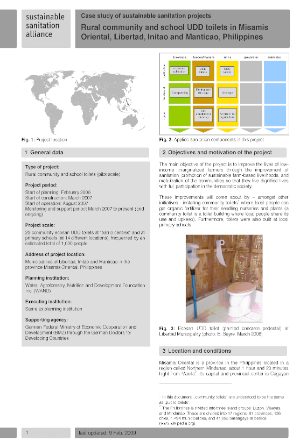Rural community and school UDD toilets in Misamis Oriental, Libertad, Initao and Manticao, Philippines - Case study of sustainable sanitation projects
Sayre, E., von Münch, E. (2009)

Published in: 2009
Publisher:
Sustainable Sanitation Alliance (SuSanA)
Author:
Sayre, E., von Münch, E.
Uploaded by:
SuSanA secretariat
Partner profile:
common upload
11922 Views
215 Downloads
Location of library entry
Content - Summary
This case study shows a pilot scale rural community and school toilets. 23 UDDTs were constructed to serve the community and the schools in the municipalities of Libertad, Initao and Manticao in the province Misamis Oriental, Philippines. Roughly 1,000 people use these toilets. The project was planned and executed by Water, Agroforestry, Nutrition and Development Foundation Inc. (WAND) with the support of the German Federal Ministry of Economic Cooperation and Development (BMZ) through the German Doctors for Developing Countries.
Double-vault urine diverting dehydration toilets (UDDTs) are used: urine and faeces are collected separately in waterless toilets. People who use water for anal cleaning ensure that this water is collected in a separate container (this water is directly used for plants and gardens). The sites where the ecosan UDD toilets are built are selected during a 2-stage process whereby local officials or school officials submit a letter of interest to the WAND Foundation, and then WAND’s field staff conducts a local assessment. The total cost of building the 23 double-vault UDD toilets was pesos 600,000 or roughly € 9,000 Euro, which includes costs for monitoring, training and general management (equivalent to € 390 per UDD toilet, including “software”).
The community members are in charge of operation and maintenance of the UDDTs since these are community toilets. A local committee is in charge of the maintenance and mainly the women do the cleaning. In the case of UDD toilets in schools (see Table 2), the school headmaster takes over responsibility of the operation and maintenance of the system. A guideline produced by the GTZ-Philippines detailed the steps on how to start an ecosan initiative (see Section 13). These steps were helpful even though it turned out that the steps, consisting of awareness raising, launching, baseline study, social preparation, decision making and implementation, do not take place in a chronological order but as an iterative process. Lessons learnt and successful factor are further explored in this case study.
Bibliographic information
Sayre, E., von Münch, E. (2009). Rural community and school UDD toilets in Misamis Oriental, Libertad, Initao and Manticao, Philippines - Case study of sustainable sanitation projects. Sustainable Sanitation Alliance (SuSanA)
Filter tags
Case studies in SuSanA template East Asia & Pacific English Faeces or faecal sludge Rural Schools Urine Urine diversion dehydration toilets (UDDTs)














